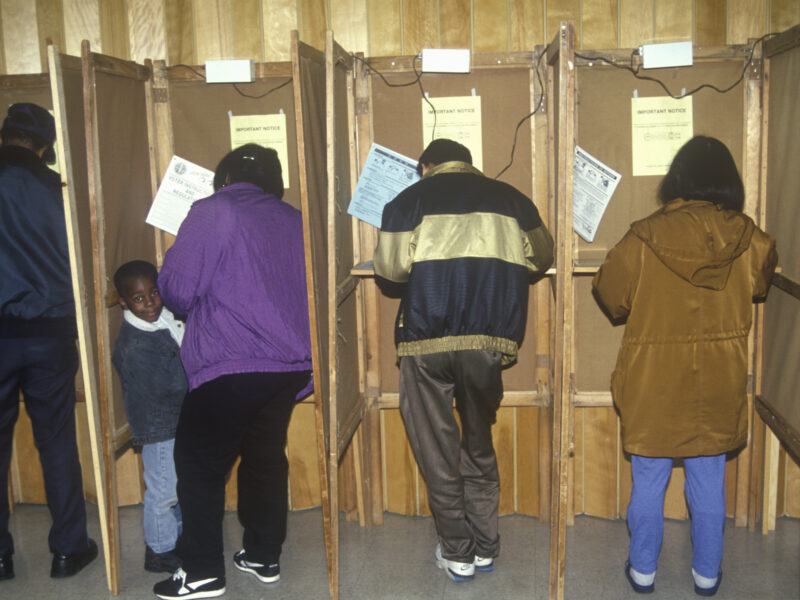Hyde Student: “So, Mr. Gauld, what are your thoughts on the election?”
Me: Hmmm… This is problematic. I have opinions. I taught U. S. History and government for years. (Hey, that’s partly why this kid is asking me in the first place.) She’s interested; I’m interested… But…
While I enjoy talking politics with students, I do not want to unduly influence the processing of their political beliefs, some of whom are exercising their right to vote for the very first time. I tend to keep them guessing as to my political views, sometimes arguing outrageous contrarian positions just to keep them on their toes. (Hey, messing with teenagers is one of the best things about this gig!) So, I tend to hold back.
This fall, I did comment on the “Do-I-Stand-or-Not?” national anthem controversy sparked by San Francisco 49er quarterback Colin Kaepernick. I spoke of my upbringing by a mother who lost her father and two brothers in WWII, of the effect that a past trip to Gettysburg had on me, and of a recent trip to Normandy with my sisters and WWII veteran father.
I made it clear that I disagreed with Mr. Kaepernick but respected his right to his decision. After stating that I will always stand during the anthem, I challenged them: “Whatever you decide to do, make an informed decision.” Then I threw some “teach” at them: “So, before you decide, come up with three good reasons to stand and three good reasons not to.”
Turning to the election, I’m still in pre-synthesis mode. Like most of the country, I was stunned by the outcome. A little over a year ago when he was among 17 Republican contenders for the red side’s nomination, I gave him zero chance for repping the GOP, to say nothing of winning the whole thing.
My quick take: The guy picked the whole country’s pocket while we were looking to “The Situation Room” to tell us what was going to happen. I mean, for anyone who doubts that truth is stranger than fiction, I’ve got two words for you: President. Trump.
In the ongoing quest to try to make sense of it all, I’ve come up with four half-baked conclusions.
1. How Could This Happen?
The day after the election, NY Times columnist Maureen Dowd wrote an interesting piece called “Absorbing the Impossible” (11/9) in which she calls upon her brother, a Republican, to explain his support of Trump. At one point she quotes a sentence in an article in The Atlantic by Salena Vito: “The press takes him literally, but not seriously; his supporters take him seriously, but not literally.” Yup.
A few days after the election, in the 11/11 New York Times, two well-known standard-bearers from opposite sides of the blue-red line weighed in with uncannily similar messages. In “The View from Trump Tower,” David Brooks (he of the Red persuasion) wrote:
Populism of the Trump/Le Pen/Brexit variety has always been a warning sign, a warning sign that there is some deeper dysfunction in our economic, social and cultural systems. If you want to take that warning sign and dismiss it as simple bigotry, you’re never going to pause to understand what’s going on and you will never know how to constructively respond.
In “Where the Democrats Go from Here,” Blue Man Group hero Bernie Sanders concurs:
Donald J. Trump won the White House because his campaign rhetoric successfully tapped into a very real and justified anger, an anger that many traditional Democrats feel… I am saddened, but not surprised, by the outcome. It is no shock to me that millions of people who voted for Mr. Trump did so because they are sick and tired of the economic, political and media status quo.
Yup and Yup.
2. The New Ivory Tower
For most of my life, “Ivory Tower” has meant “elite university.” Somewhere in recent history the media usurped the distinction. This week I spent some time perusing pre-November 8 on-line editorials and headlines about the presidential race. There’s a discernible smugness in the mainline press regarding the assumption of the inevitability of a Clinton victory. While the liberal standard bearers support her, their focus is clearly on how bad he is as opposed to how great she would be. Some of that was due to Trump’s A.B.C. approach. (See the photo below from Glengarry Glen Ross featuring a younger version of our current #1 Donald Trump impersonator.) The man is always on offense. Everyone around him starts back-pedaling.
Like him or not, Trump was a master at making the whole thing about him. He was on the screen all the time. His incessant around-the-clock tweeting, while his opponents were struggling to remember their log-in passwords, clearly influenced the outcome. I’m thinking that Trump won the “dual-surfer” vote: Those with one eye on social media and the other scanning through their TV channels in mute mode. They saw an awful lot of The Donald. (And I’m guessing they were out of their chairs fetching chips and drinks during Hillary’s commercials.)
Arriving on the scene in 1980, CNN was a force of disruptive innovation. The idea of 24-hour news was both novel and exciting. Then came the imitative competitors. Then came the Internet. CNN seemed to lose its footing during the mid-90s when it became “The All OJ All The Time” Network. Since then, it seems to have been a bit unsure of its news vs. entertainment balance. The Donald was able to exploit this uncertainty for his own gain.
3. Facebook and Closet Voters
As of this writing, I’ve got 1,276 Facebook friends with the largest grouping (by far) being former students and their parents. (Hey, you don’t get rich in my profession but there are other compensatory upsides!) For me, Facebook has evolved into an awesome address book and a way to easily share casual fun and friendship with people I care about. I read social and political commentary with interest but tend to refrain from joining in. (Full Disclosure: As I write, I wonder: Do I post the link to this piece? Hmmm…)
Heading into the election, it seemed obvious that a decisive majority of my Facebook friends would be voting for Hillary. For one, most of the post-nominee selection political posts I saw were decidedly in her camp. For another, not only were pro-Trump posts in a minority, those who posted them tended to receive quick reactions, and I’m not talking about the “Like” button. An objective onlooker to my Facebook page might well have concluded that it ain’t all that easy being a Trump supporter.
While we’ll never know just how many Trump supporters simply kept their secret to themselves until they stepped into the voting booth, there were clearly a lot more than anyone – and that includes all the so-called experts – would have predicted. Having lived thru Goldwater v. LBJ, Nixon v. McGovern, Reagan v. Carter, and Bush II v. Gore, I believe I’m on safe ground in saying that this race took emotional divisiveness to new heights… er, depths.
4. As Maine Goes?
In the NY Times series This Land Is Your Land – Reflections from Trump’s America there is a piece titled “A State That is of Two Minds” in which Michael Paterniti tries to make sense of Maine’s status as the only state in the union to split its electoral votes – 3 to Clinton; 1 to Trump – between the 2 candidates. (To inject some historical perspective here, the rock-ribbed Republican Maine of my youth has voted Democratic in the last six elections.) He writes of taking a drive from Portland (Maine’s largest city = 76% for Clinton) up to rural Trump-supporting northern towns like Madison, Norridgewock, Skowhegan, and… Clinton (lol).
Paterniti’s conversation with a Bangor minister who began the race as a supporter of “Brother Bernie” (his words) and wound up voting for Trump was telling. The son of a Millinocket (a once booming paper town whose mills have vanished) union leader, he feels that agreements like NAFTA and the Trans-Pacific Partnership (TPP), both signed by Democratic presidents, have amounted to harsh betrayals of the interests of blue-collar Democrats. While this minister had his problems with Trump, he simply wasn’t going to vote for anyone who wouldn’t denounce NAFTA and TPP. (Note: If you’re not able to visit the aforementioned towns, re-read this paragraph with Springsteen’s “Your Hometown” playing in the background.)
Many of those disgusted with the notion of anyone voting for Trump have lodged charges of racism and bigotry. Might apply to some, but I just don’t get that sense from the Bangor minister or those other northern Mainers who threw in with Trump. Last week in a Boston Globe piece titled “The Idea that America ‘Doesn’t Talk About’ Racism is Absurd,” Columbia professor James McWhorter writes:
The way we use the word “racism’’ has become so imprecise, abusive, and even antithetical to genuine activism that change is worth addressing. More to the point, it widens the cultural divide between the elites and the people too often breezily termed the ones “out there.’’
Maine humorist Tim Sample has a quip that goes something like this: “Maine is elementally pragmatic. Maine people don’t care much about your race, religion, or what you do in the bedroom. We just want to know, do you have jumper cables and will you stop?” (Fun Fact: Tim attended Hyde in the late 60’s.) The last I heard, Maine is the least racially diverse state in our nation. That may be, but its people embody a work ethic and sense of fairness that complemented significantly Laura’s and my efforts to raise three children here. (To witness these qualities in action, check out HBO’s Real Sports with Bryant Gumbel‘s inspiring program on the Lewiston H.S. boy’s soccer team, a squad composed of teenagers from Somalia, Kenya, Congo, Germany, Turkey, and the United States.)
While I was initially a-/bemused by Mr. Trump’s candidacy, he lost me for good with his disrespectful comments about John McCain’s heroic behavior as a Vietnam POW. While he said that he wanted his heroes to not be caught, I realized I wanted presidents with more civility than he was offering. Of course, it never occurred to me that he would ever actually be The President. Last Saturday night, Dave Chappelle, as only he could, stated a willingness to give Trump a chance. I’m doing likewise. My highest hope is that Mr. Trump will spark a new era of entrepreneurialism that I believe is desperately needed in our economic and social fabric. My worst fear is that his civility, or lack thereof, will sink to depths that will cause our national morale to fall to a level that will make Jimmy Carter’s 1979 Crisis of Confidence/“malaise” speech look like the good old days. (And you students who don’t get that last point… Google it!)
Onward, Malcolm Gauld


